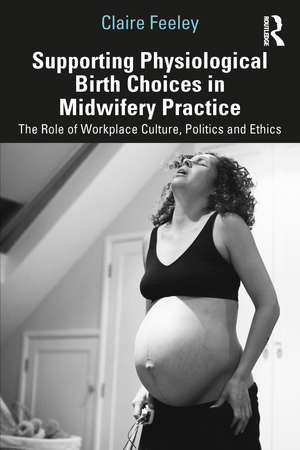Supporting Physiological Birth Choices in Midwifery Practice: The Role of Workplace Culture, Politics and Ethics
Autor Claire Feeleyen Limba Engleză Paperback – 28 feb 2023
This book investigates the processes, experiences and sociocultural-political influences upon midwives who support women’s alternative birthing choice and argues for a shift in perspective from notions of an individual’s professional responsibility to deliver woman-centred care, to a broader, collective responsibility. The book begins by contextualising the importance of quality midwifery care with an exploration of the current debates to demonstrate how hegemonic birth discourse and maternity practices have detrimentally affected physiological birth rates, and the wellbeing of women who opt outside of maternity guidelines. It provides real life examples of how midwives can facilitate a range of birthing decisions within mainstream midwifery services. Moreover, an exploration of midwives’ experiences of delivering such care is presented, revealing deeply polarised accounts from moral injury to job fulfilment. The polarised accounts are then presented within a new model to explore how a midwife’s socio-political working context can significantly mediate or exacerbate the vulnerability, conflict and stigmatisation that they may experience as a result of supporting alternative birth choices. Finally, this book explores the implications of the findings, looking at how team and organisational culture can be developed to better support women and midwives, making recommendations for a systems approach to improving maternity services.
Discussing the invisible nature of midwifery work, what it means to deliver woman-centred care, and the challenges and benefits of doing so, this is a thought-provoking read for all midwives and future midwives. It is also an important contribution to interprofessional concerns around workforce development, sustainability, moral distress and compassion in health and social care.
| Toate formatele și edițiile | Preț | Express |
|---|---|---|
| Paperback (1) | 265.26 lei 3-5 săpt. | +14.45 lei 7-13 zile |
| Taylor & Francis – 28 feb 2023 | 265.26 lei 3-5 săpt. | +14.45 lei 7-13 zile |
| Hardback (1) | 1029.72 lei 6-8 săpt. | |
| Taylor & Francis – 28 feb 2023 | 1029.72 lei 6-8 săpt. |
Preț: 265.26 lei
Preț vechi: 279.23 lei
-5% Nou
Puncte Express: 398
Preț estimativ în valută:
50.76€ • 52.99$ • 42.01£
50.76€ • 52.99$ • 42.01£
Carte disponibilă
Livrare economică 15-29 martie
Livrare express 01-07 martie pentru 24.44 lei
Preluare comenzi: 021 569.72.76
Specificații
ISBN-13: 9781032208275
ISBN-10: 1032208279
Pagini: 178
Ilustrații: 3 Tables, black and white; 2 Line drawings, black and white; 2 Illustrations, black and white
Dimensiuni: 156 x 234 x 13 mm
Greutate: 0.26 kg
Ediția:1
Editura: Taylor & Francis
Colecția Routledge
Locul publicării:Oxford, United Kingdom
ISBN-10: 1032208279
Pagini: 178
Ilustrații: 3 Tables, black and white; 2 Line drawings, black and white; 2 Illustrations, black and white
Dimensiuni: 156 x 234 x 13 mm
Greutate: 0.26 kg
Ediția:1
Editura: Taylor & Francis
Colecția Routledge
Locul publicării:Oxford, United Kingdom
Public țintă
Postgraduate, Professional, and Undergraduate AdvancedCuprins
1.Introduction. 2.Rhetoric vs. Reality: The power of hegemonic birth practices. 3.Counter discourses; Resistance in action. 4.Moral Compromise and distress: Midwives’ invisible wounds. 5.Psychologically safe work environments: Creating the conditions for fulfilment. 6.Stigmatised to normal practice: A new lens. 7.Shifting the lens: Towards a collective responsibility. 8.Appendices
Notă biografică
Claire Feeley is a clinical midwife and researcher with over 13 years’ experience in maternal, perinatal and infant health. Formerly the editor-in-chief of The Practising Midwife, Dr Feeley is now a lecturer and researcher at King’s College London.
Descriere
Highlighting the experiences of midwives who provide care to women opting outside of guidelines in the pursuit of physiological birth, Claire Feeley looks at the impact on midwives themselves, and explores how teams and organisations can support or discourage the promotion of women’s birth choices.
